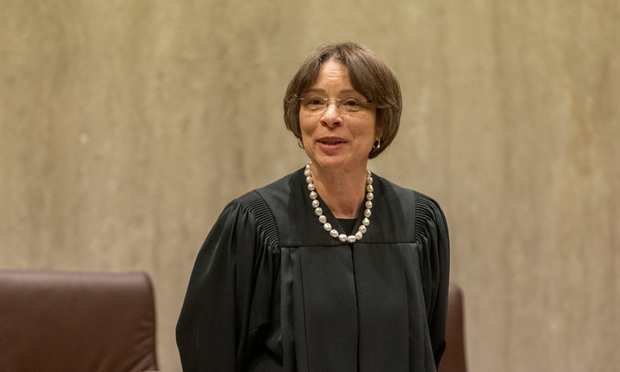Blocked Marketer Loses Bid for Restored Access to Facebook Platforms
U.S. District Chief Judge Phyllis Hamilton of the Northern District of California said content-marketing firm Stackla did not persuade her that Facebook's decision to block the company from its social media sites was a pretext for protecting the social media platform's reputation.
September 25, 2019 at 03:36 PM
4 minute read
 U.S. District Chief Judge Phyllis Hamilton, Northern District of California. Photo: Jason Doiy/ALM
U.S. District Chief Judge Phyllis Hamilton, Northern District of California. Photo: Jason Doiy/ALM
A former Facebook marketing partner will remain cut off from the social media giant's ecosystem after failing to convince a federal judge that Facebook acted outside its rights when revoking the company's licenses to its platforms.
In a bench ruling, U.S. District Chief Judge Phyllis Hamilton of the Northern District of California denied content marketer Stackla's motions for a temporary restraining order and preliminary injunction that would restore the company's access to Facebook and Instagram.
At Wednesday's hearing, Jeffrey Tsai of DLA Piper in San Francisco argued on behalf of Stackla that Facebook's decision to boot the company from its sites was a pretext to protect its reputation after a Business Insider article wrongfully implicated the company in "Instagram's Cambridge Analytica Moment." Tsai said it was wrong of Facebook to terminate its contracts with Stackla seven days after the article was published, without a chance for Stackla to defend itself.
"I'm not persuaded by the pretextual argument, and I think [Facebook is] entitled to rely on the Business Insider article as a basis to initiate further inquiry," Hamilton said.
Stackla, which uses artificial intelligence to connect brands with publicly available user-generated social media posts, gathers approximately 80% of its content from Facebook and Instagram, according to a declaration from company CEO Damien Mahoney.
On Aug. 30, Stackla received a cease-and-desist letter from Facebook after Business Insider reported that the company was among several marketing partners that violated Instagram's terms of service by scraping and storing user data. In its letter to Stackla, Facebook outlined alleged violations of the federal Computer Fraud and Abuse Act and the California Comprehensive Computer Data Access and Fraud Act, as well as Facebook and Instagram's terms of use.
Stackla claims it only uses an approved application programming interface to access user data and that Facebook's accusations are unfounded—fueled not by evidence of wrongdoing, but an effort to avoid more backlash around its privacy protocols. However, Facebook has said it began investigating Stackla well before the marketer received any bad press.
Representing Facebook, Sonal Mehta of Wilmer Cutler Pickering Hale and Dorr, said the company's first investigation of Stackla's privacy violations began in May after receiving a tip. The initial investigation was inconclusive, but in August the company escalated its inquiry and Facebook's anti-scraping team found evidence of automated scraping of user data.
"If you look at the number of calls being made in our system, it wouldn't be possible to do that manually," Mehta said. "It would have to be automated, and that expressly violates our terms."
Mehta also argued that Stackla failed to show evidence of irreparable harm required to invoke a temporary restraining order. Hamilton agreed.
"I am not convinced you've established irreparable harm," she said. "You use speculative language like 'it might happen soon' … and 'will soon reach a tipping point.'"
The judge did not consider in her decision a last-minute declaration added the night before the hearing, because she did not get a chance to read it and the defense did not have a chance to respond. A redacted declaration from Seann Birkelund, Stackla's chief financial officer and chief operating officer, gave more concrete details of the companies reportedly declining financial situation. Stackla's lawyers asked to file the declaration under seal.
Even with the benefit of Birkelund's input, Mehta said that Stackla undermines its case for emergency intervention. "In that declaration, Stackla states how many days they have left," she said. "It's not a handful of days, not this week, and not the week after." Additionally, she said, less than 10% of Stackla's 380 customers have threatened to cancel contracts.
The judge also ruled that Stackla did not fulfill the public interest prong of its temporary restraining order. The company argued that it was in the public's interest to prevent "the imminent destruction of Stackla's business and certain insolvency while the Court examines the legal issues prevents the termination of Stackla's client contracts, preserves employee jobs and investor relations."
"Equally if not more critical here is the public interest requirement," she said. "I don't find that the temporary restraining order will be in the public interest."
This content has been archived. It is available through our partners, LexisNexis® and Bloomberg Law.
To view this content, please continue to their sites.
Not a Lexis Subscriber?
Subscribe Now
Not a Bloomberg Law Subscriber?
Subscribe Now
NOT FOR REPRINT
© 2025 ALM Global, LLC, All Rights Reserved. Request academic re-use from www.copyright.com. All other uses, submit a request to [email protected]. For more information visit Asset & Logo Licensing.
You Might Like
View All
K&L Gates Files String of Suits Against Electronics Manufacturer's Competitors, Brightness Misrepresentations
3 minute read
California Court Denies Apple's Motion to Strike Allegations in Gender Bias Class Action

White & Case KOs Claims Against Voltage LLC in Solar Companies' Trade Dispute

Trending Stories
- 1The Week in Data Jan. 24: A Look at Legal Industry Trends by the Numbers
- 2The Use of Psychologists as Coaches/Trial Consultants
- 3Could This Be the Era of Client-Centricity?
- 4New York Mayor Adams Attacks Fed Prosecutor's Independence, Appeals to Trump
- 5Law Firm Sued for $35 Million Over Alleged Role in Acquisition Deal Collapse
Who Got The Work
J. Brugh Lower of Gibbons has entered an appearance for industrial equipment supplier Devco Corporation in a pending trademark infringement lawsuit. The suit, accusing the defendant of selling knock-off Graco products, was filed Dec. 18 in New Jersey District Court by Rivkin Radler on behalf of Graco Inc. and Graco Minnesota. The case, assigned to U.S. District Judge Zahid N. Quraishi, is 3:24-cv-11294, Graco Inc. et al v. Devco Corporation.
Who Got The Work
Rebecca Maller-Stein and Kent A. Yalowitz of Arnold & Porter Kaye Scholer have entered their appearances for Hanaco Venture Capital and its executives, Lior Prosor and David Frankel, in a pending securities lawsuit. The action, filed on Dec. 24 in New York Southern District Court by Zell, Aron & Co. on behalf of Goldeneye Advisors, accuses the defendants of negligently and fraudulently managing the plaintiff's $1 million investment. The case, assigned to U.S. District Judge Vernon S. Broderick, is 1:24-cv-09918, Goldeneye Advisors, LLC v. Hanaco Venture Capital, Ltd. et al.
Who Got The Work
Attorneys from A&O Shearman has stepped in as defense counsel for Toronto-Dominion Bank and other defendants in a pending securities class action. The suit, filed Dec. 11 in New York Southern District Court by Bleichmar Fonti & Auld, accuses the defendants of concealing the bank's 'pervasive' deficiencies in regards to its compliance with the Bank Secrecy Act and the quality of its anti-money laundering controls. The case, assigned to U.S. District Judge Arun Subramanian, is 1:24-cv-09445, Gonzalez v. The Toronto-Dominion Bank et al.
Who Got The Work
Crown Castle International, a Pennsylvania company providing shared communications infrastructure, has turned to Luke D. Wolf of Gordon Rees Scully Mansukhani to fend off a pending breach-of-contract lawsuit. The court action, filed Nov. 25 in Michigan Eastern District Court by Hooper Hathaway PC on behalf of The Town Residences LLC, accuses Crown Castle of failing to transfer approximately $30,000 in utility payments from T-Mobile in breach of a roof-top lease and assignment agreement. The case, assigned to U.S. District Judge Susan K. Declercq, is 2:24-cv-13131, The Town Residences LLC v. T-Mobile US, Inc. et al.
Who Got The Work
Wilfred P. Coronato and Daniel M. Schwartz of McCarter & English have stepped in as defense counsel to Electrolux Home Products Inc. in a pending product liability lawsuit. The court action, filed Nov. 26 in New York Eastern District Court by Poulos Lopiccolo PC and Nagel Rice LLP on behalf of David Stern, alleges that the defendant's refrigerators’ drawers and shelving repeatedly break and fall apart within months after purchase. The case, assigned to U.S. District Judge Joan M. Azrack, is 2:24-cv-08204, Stern v. Electrolux Home Products, Inc.
Featured Firms
Law Offices of Gary Martin Hays & Associates, P.C.
(470) 294-1674
Law Offices of Mark E. Salomone
(857) 444-6468
Smith & Hassler
(713) 739-1250






